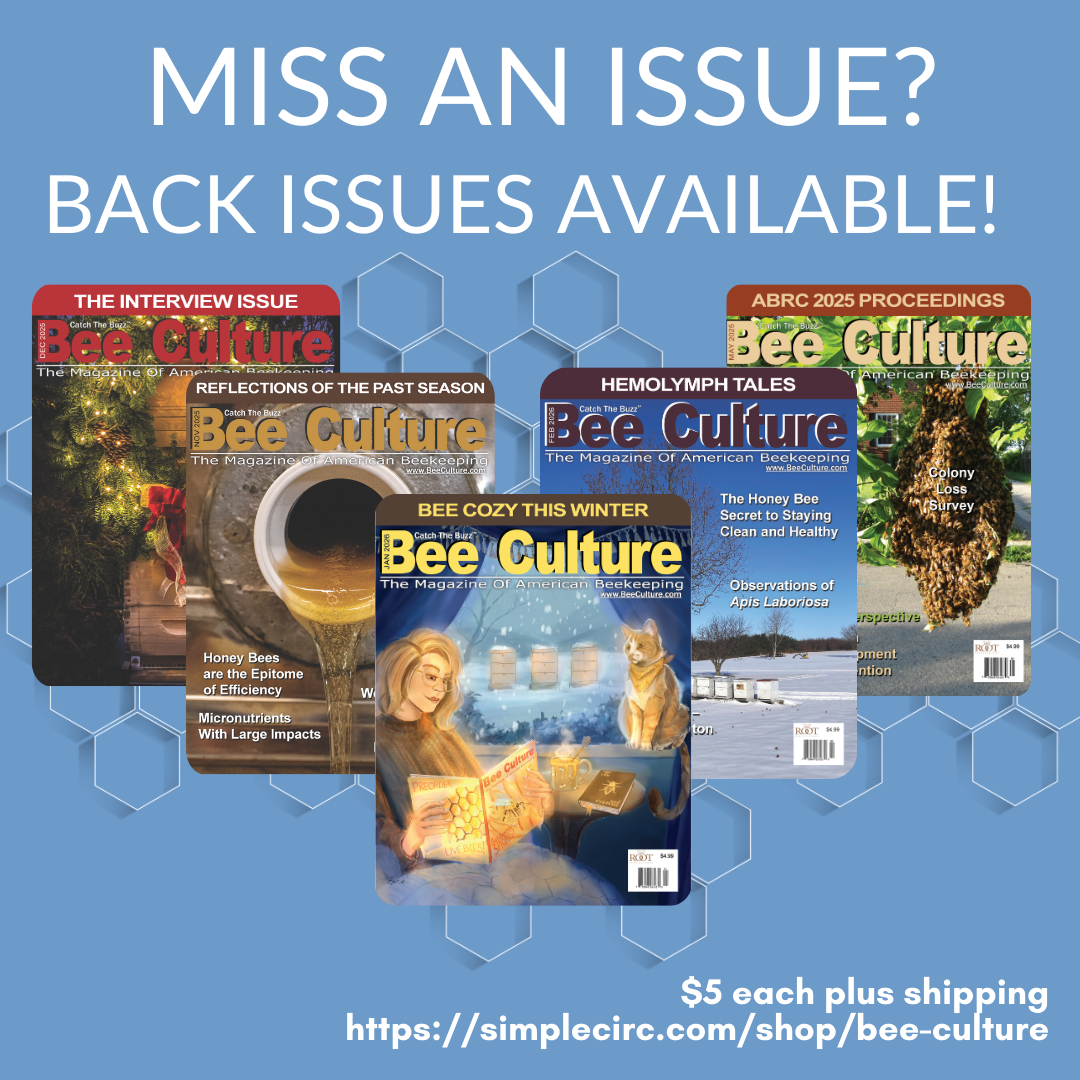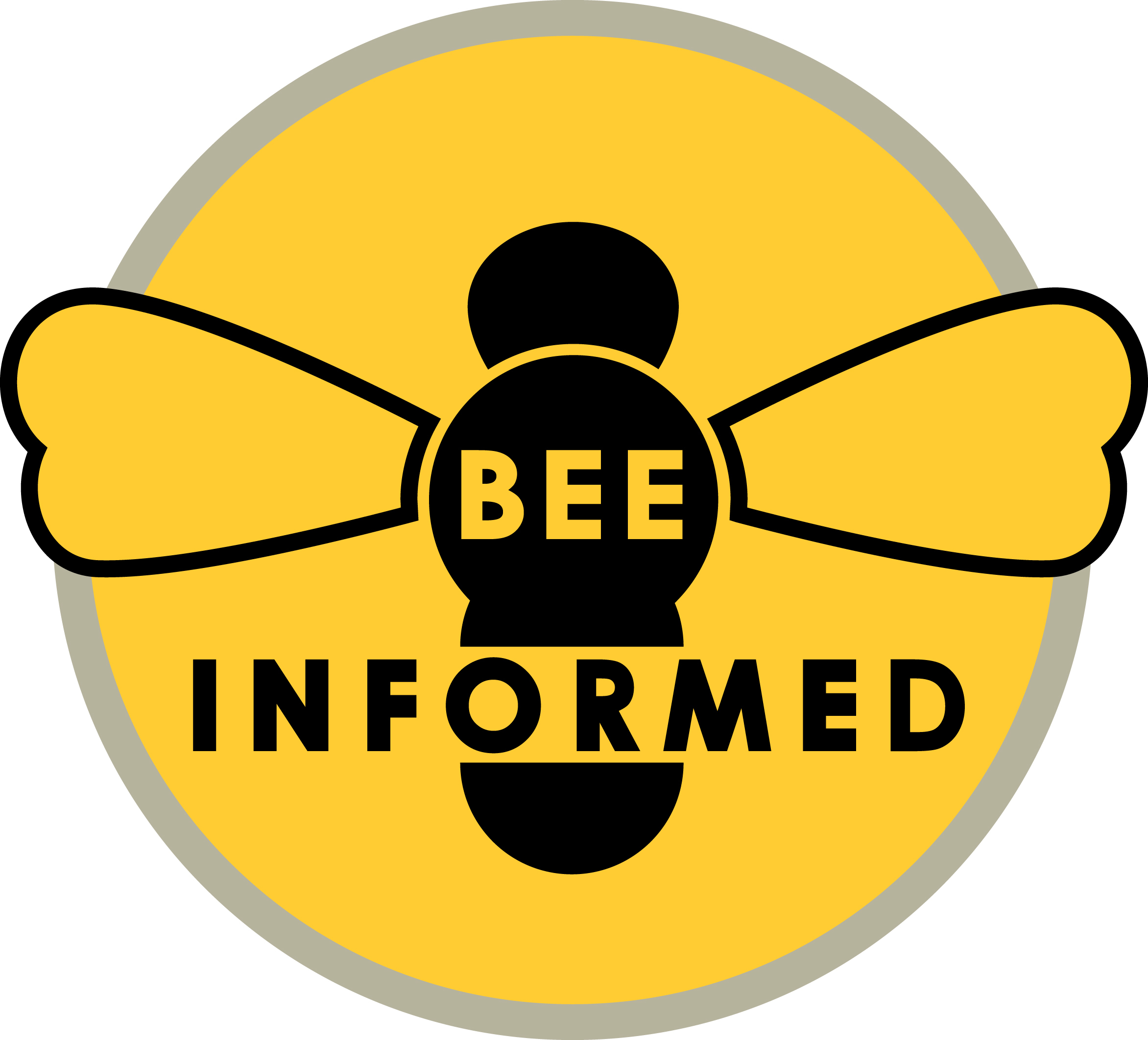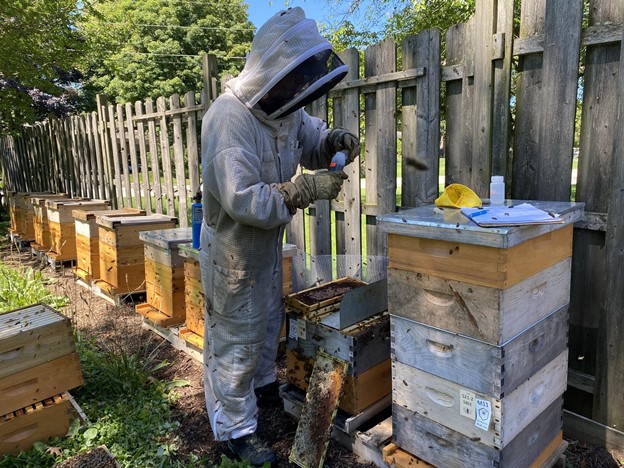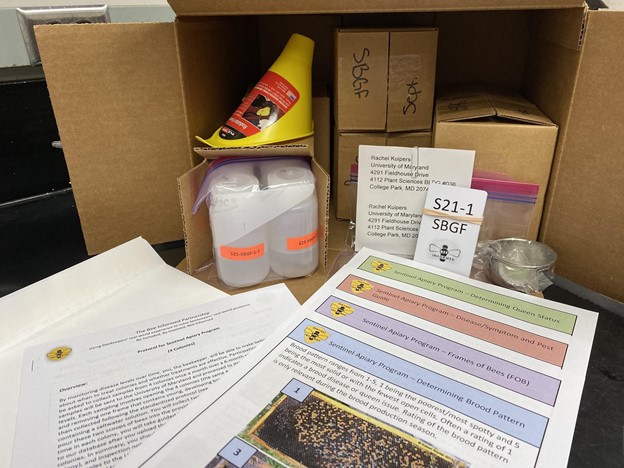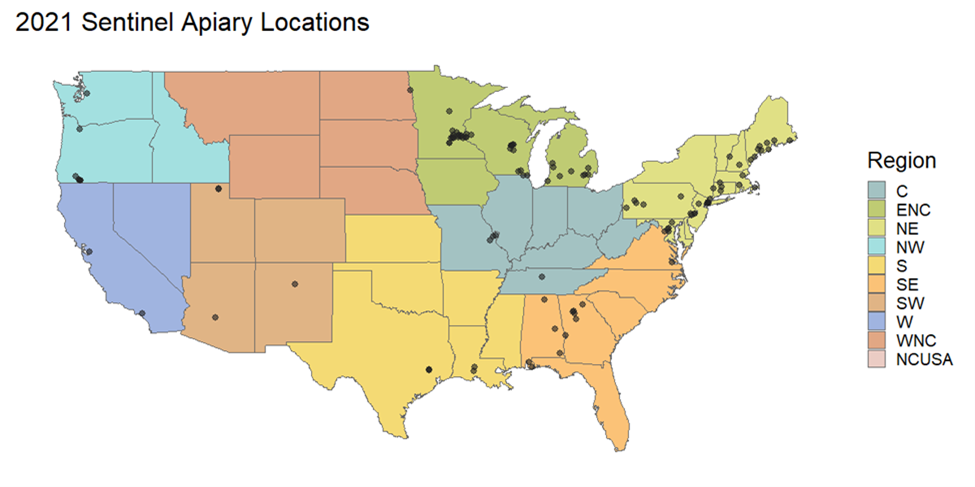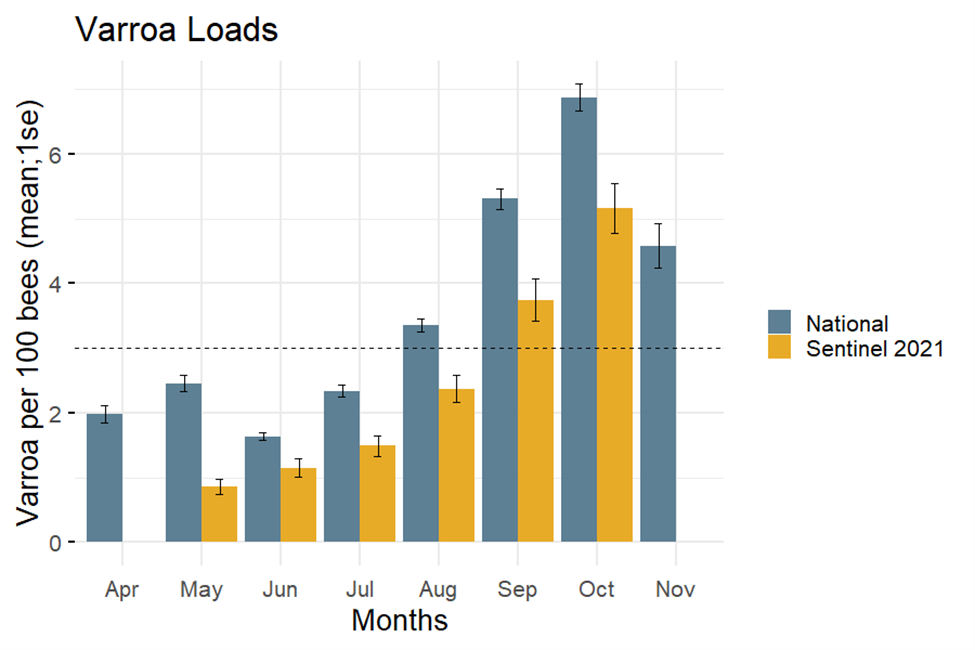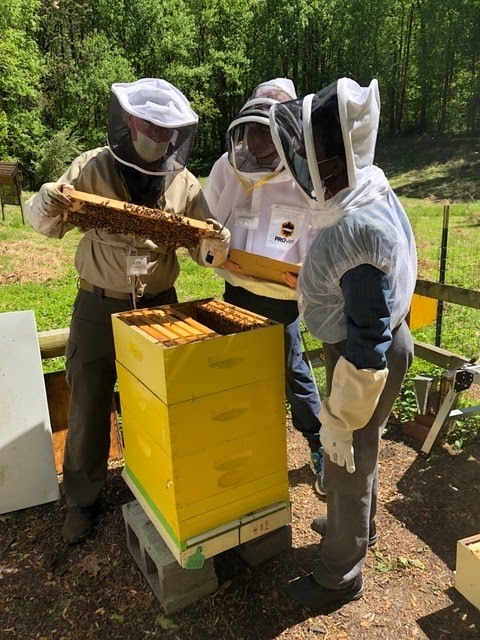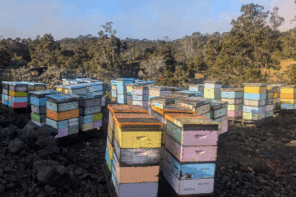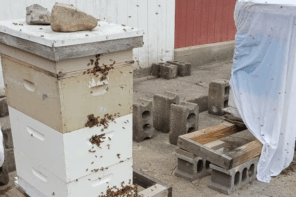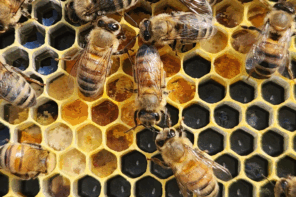Become A Better Beekeeper
Rachel Kuipers & Jeri Parrent & Nathalie Steinhauer
Bee Informed Partnership
Here at Bee Informed Partnership, we are excited to announce that registration for the 2022 Sentinel Program is open now through the end of April! Don’t delay – register today by completing the quick and easy online registration form at: beeinformed.org/sentinel-sign-up/
What is the Sentinel Apiary Program and How Does It Work?
Bee Informed Partnership’s Sentinel Apiary Program is a citizen-science project designed to help participants regularly monitor their colonies for Varroa, Nosema, signs and symptoms of common pests and diseases, and overall colony health. In addition to helping beekeepers improve colony health and survival rates, the information collected from the Sentinel program also provides this invaluable information regarding regional and national honey bee health metrics to researchers and beekeepers. The program also offers a number of educational resources available to beekeepers, regardless of their participation status.
Beekeepers who register for the Sentinel Apiary Program receive a kit containing the instructions and supplies that they will need to participate (Figure 1). From May to October, Sentinel beekeepers inspect and sample the same four, eight, or 12 participating colonies monthly with materials provided in the Sentinel kits.
The samples and beekeeper notes collected by Sentinel participants are sent to the University of Maryland Honey Bee Lab where they are analyzed for Varroa and Nosema loads. When lab processing is complete, the results and inspection notes are combined into a report that tracks their apiary health over time. The combination of lab results, inspection data, and management notes collected from the same colonies over time is extremely valuable for tracking seasonal and geographic trends in colony health and disease.
This past season, there were 92 Sentinel participants who sampled over 500 colonies across 129 unique locations. The University of Maryland Honey Bee Lab processed 2,312 samples from Sentinel colonies throughout the season. That’s a lot of samples—a record for the program! We also reached eight of the nine NOAA climatic regions, as well as the non-continental U.S. (Figure 2).
Sentinel Results Reveal Real Benefits
Sentinel program results from the past several years show that Sentinel participants tend to have colonies with lower average detectable Varroa loads than the national averages reported from the National Honey Bee Disease Survey (NHBS), a USDA-funded annual survey organized by the University of Maryland Honey Bee Lab in collaboration with the Apiary Inspectors of America. This lower average is due in large part to the timely management actions taken in response to the results Sentinel participants receive from their monthly colony health monitoring and testing efforts.
Results from the 2021 season were consistent with those from previous years: Sentinel participants had colonies with lower average Varroa loads throughout the season than the national average reported for colonies sampled as part of the NHBS (Figure 3, next page). Varroa were detected in over 60% of Sentinel samples. Varroa loads peaked in October, with detectable levels in 82% of samples—half of which were above the 3% action threshold. This is on par with previous years of data.
2021 Sentinel Program Highlights
To continue to improve community building and information exchange within the program, in 2021 BIP began holding monthly Zoom meetings and webinars for Sentinel participants, where Sentinel beekeepers from across the country came together to share their experiences, ask questions, and learn from BIP’s own honey bee health experts, as well as one other. We also expanded our publicly available educational resources with instructional videos demonstrating how to perform colony inspections that are available on our YouTube channel where you can find a variety of educational resources – subscribe now!
In 2021 BIP’s incredible IT team introduced changes to the BIP mobile app so Sentinel participants were able to use it to upload their inspection notes directly from their bee yards to our database. The IT team also designed an online dashboard where Sentinel participants were able to directly download their reports and raw data.
We also began building connections with bee organizations across the country through our new sponsorship program, in which groups sponsor Sentinel participation for their members by subsidizing the program via discount codes. By sponsoring discounts for their members, these organizations were not only able to increase the accessibility of the program for their members, they helped other beekeepers in their communities by monitoring a greater number of colony health metrics.
Expanding the Sentinel Apiary Program
In response to the success of our beekeeping organization sponsorhip program, in 2022 we are continuing our efforts to expand this exciting opportunity. Clubs choose their sponsorship level: they can cover the full cost of participation, a percentage of the cost, or a set amount per kit, as well as the number of participants who can take part. Sponsoring organizations may have access to the online dashboard tool that displays their members’ results, depending on the sponsorship level and permission of the participating members. Furthermore, in addition to our existing four- and eight- colony kits, 12 colony kits are also available—perfect for bee clubs with multiple yards. And individual kits of any size can now be used across multiple apiaries.
BIP’s Sentinel Apiary Program registration fees are priced at-cost, so the discounts these organizations provide to their members increase the affordability and accessibility of the program for their members, while helping to cover the costs needed to keep the program up and running. We are incredibly grateful to the individuals and organizations who have made these collaborations happen—thank you! If your local club is interested we would love to talk with you about sponsorship opportunities. Contact Sentinel Program Coordinator Rachel Kuipers at rkuipers@umd.edu.
Clubs choose their sponsorship level: they can cover the full cost of participation, a percentage of the cost, or a set amount per kit, as well as the number of participants who can take part. Sponsoring organizations may have access to the online dashboard tool that displays their members’ results, depending on the sponsorship level and permission of the participating members.
BIP’s Sentinel Apiary Program registration fees are priced at cost, so the discounts these organizations provide to their members increase the affordability and accessibility of the program for their members, while helping to cover the costs needed to keep the program up and running. By increasing the number of Sentinel participants in a geographic region, this also improves the amount and resolution of colony health data for that area, which helps all beekeepers. If your local club is interested in joining the Sentinel Apiary Program, we would love to talk with them about sponsorship opportunities. For more information, contact Sentinel Apiary Program Coordinator Rachel Kuipers at rkuipers@umd.edu.
Register Now!
We’re excited about the new changes we’ve made to the Sentinel Program and to see what the upcoming 2022 season will bring! Once again, make sure to visit the Bee Informed Partnership’s Sentinel Apiary Program webpage (beeinformed.org/sentinel), where you can register to join the Sentinel community, learn more about the program, review reports from past years, and so much more!
Happy Beekeeping!



